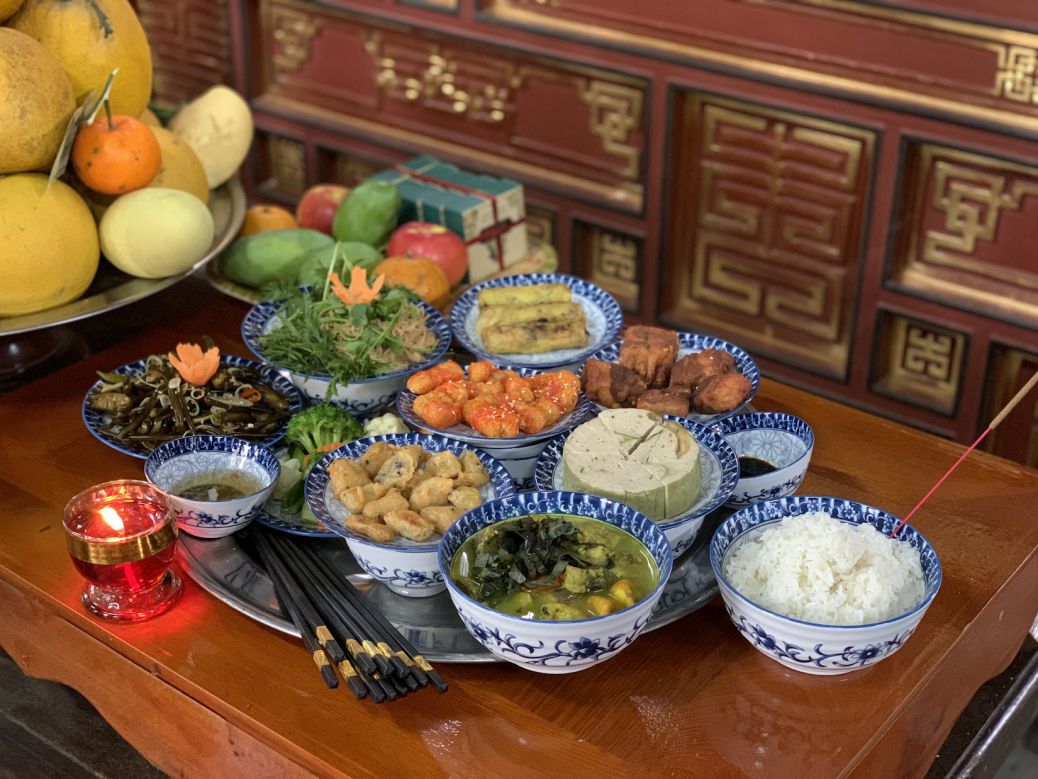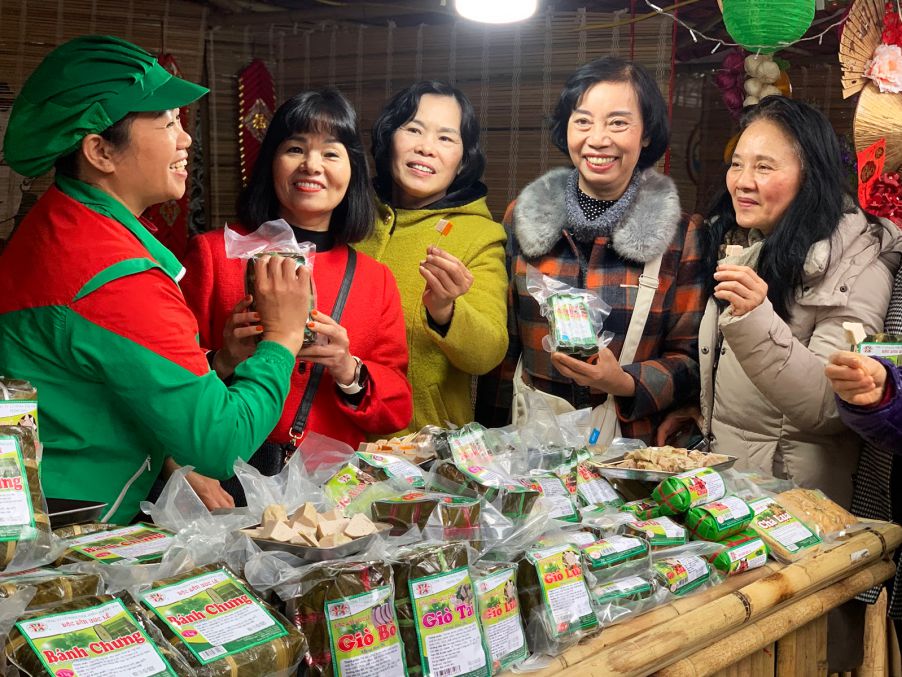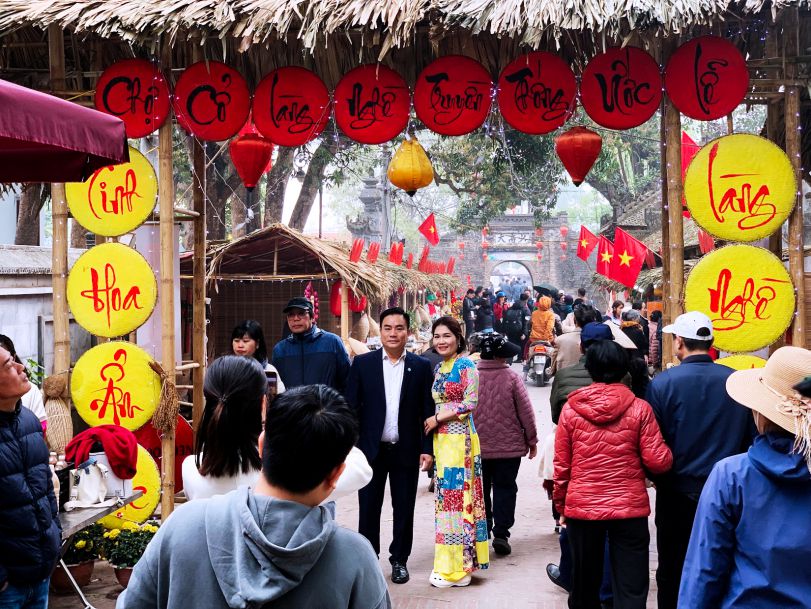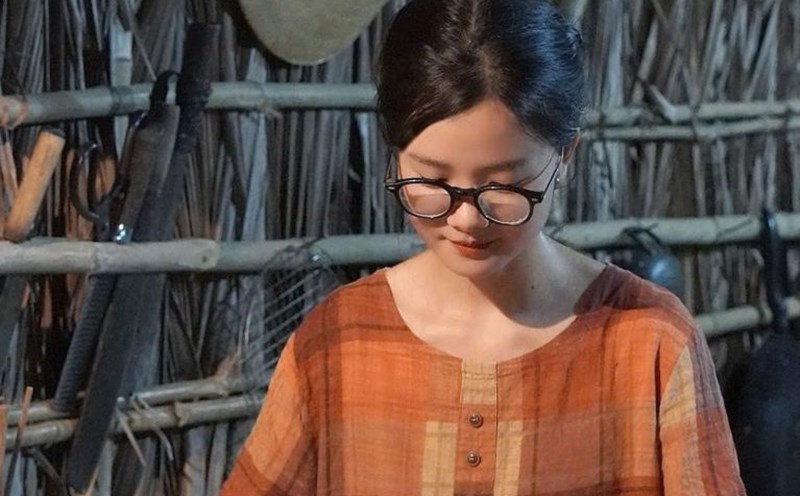wait until "Tet again" to celebrate Tet
Under the rainy weather of spring, people in Uoc Le enthusiastically went to celebrate the village festival. It is a tradition that when people across the country go to worship, Spring trips, festivals... on the 15th day of the first lunar month, the children of Uoc Le village return home for the second Tet holiday. The villagers still call this the day of "Tet Lai" or "Tet Khong". Perhaps few villages have a traditional summer festival atmosphere on Lunar New Year like here.
According to traditional customs, the people of Uoc Le village are most busy doing business during Tet, only after the full moon do they have time to meet, wish a happy New Year, go to parties... From the afternoon of the 14th of the first lunar month, the whole village will be crowded with relatives gathering at the rice table like a year.
On the morning of the full moon day, each household offered ancestral and spiritual offerings early. Decently, from the elderly to the children, dressed up in clothes to go to the pagoda to worship, ask for lumps or meet neighbors, greet and wish a happy new year. On the roads passing through the colorful green fields of the Spring solstice, the crowd of people bustlingly went to the tomb, worshiped the pagoda, asked for lumps... before returning home to eat the "Tet holiday".
The Lunar New Year's Day is the time when the village in the village is most bustling, bustling with tables and drinks. Visitors from all over also come to enjoy the village festival, try some ham, buy gifts from the countryside to bring back... The elderly in the village believe that the larger the feast, the more the children gather, the more proud they are.
Mr. Nguyen Viet Tan, representative of the Uoc Le City Council, said that the 15th day of the first lunar month is almost the Day of the pig-shaped village.
"For generations, pig farmers have had to go far from home to the city to do business, and only have the opportunity to visit their hometown on the 15th of the first lunar month. This day is like a New Year's Day, like a holiday, like a festival, like a Tet holiday...", Mr. Tan expressed.
Sitting to receive guests to come home to celebrate Tet, Ms. Nguyen Thi Thu Huong, the owner of one of the big Uoc Le pig shop families in Hanoi, told the story of a cup of hot and cheerful tea, having been a daughter-in-law of the village for 34 years, "Tet" has never been less crowded. In particular, if the full moon day falls on the right weekend, the whole village will celebrate Tet even larger.
She said that the Uoc Le villagers traveled from the North to the South, living by traditional crafts. Those who work as pig-sweaters are used to the busy scene until the 30th night of Tet. It was not until the 14th of the full moon that the children of Uoc Le returned home to reunite, the whole village was as bustling as before Tet. The 15th day of the first lunar month is an occasion to welcome relatives and friends from far away to "Tet home" with the villagers. In the afternoon, when the children and grandchildren left the village to return to urban life, the alleys in Uoc Le were as quiet as ever.



The ancient scent of the ancient village
This year, the village association in Uoc Le village has a much larger community. From January 14, the village festival begins with the ceremony performed by the elders at the communal house. The offerings are indispensable with large cinnamon pipes, pork rolls, banh chung, banh giay... The Association has been renovated with experiential activities. For the first time, villagers gathered to open a rural market in the space of an ancient communal house and ancient temple, next to the hundred-year-old bridge gate.
Mr. Nguyen Viet Tuong (58 years old), - Head of Uoc Le village, said that this year the village festival recreates the scene of the ancient market, with 18 booths displaying traditional products. This is a space for villagers from near and far to experience and enjoy traditional specialties such as pork rolls, sponge cakes, moon cakes, sweet soup...
"This year's Uoc Hoc Village Festival takes place in a joyful and meaningful atmosphere. This is not an ordinary festival but an opportunity to honor the traditional customs and crafts of the village. The pig-shaped profession of the village has developed strongly and spread throughout the country, thanks to the efforts of the people and the support from all levels of government, said Mr. Tuong.
The Uoc Le Village Festival is not only an opportunity for children far from home to meet and exchange, but also an opportunity to promote the traditional pig-stabbing profession.
Ms. Truong Thi Thoa (73 years old, Cau Giay, Hanoi) learned about the Uoc Le village association through a friend from her hometown here. From early morning on the 15th day of the first lunar month, she took 3 buses from the city center to the village to visit the old school she studied at when she evacuated to Thanh Oai during the war years.
"Coming to Uoc Le village on the full moon day, I was able to relive the festivals of the past. In the city now, children rarely see neighbors greeting and wishing a happy New Year like that, Ms. Thoa shared after walking around a rural market to buy all the specialties from silk pigs to fruits.
As for Ms. Lien Huong (62 years old, Budapest, Hungary), experiencing the "Tet holiday" atmosphere in the ancient village is a precious thing for someone living far from Vietnam like me. Coming back to visit the village with friends, the female tourist from Hanoi could not help but feel overwhelmed when she stepped on the red brick road, saw the ancient village gate, the ancient communal house roof under the shade of the past. More special is the opportunity to enjoy local specialties.
"The day before Tet, it was very difficult to find a pig for the Uoc Le in the city. Now that we are free to experience this, there is nothing better than that," said Ms. Huong, adding that she will buy spring rolls as gifts for friends and relatives in Ho Chi Minh City.
On the Spring Day of Uoc Le village, visitors can also visit the ancient village communal house, the 500-year-old Book pagoda from the Mac Dynasty - National Architectural and Artistic Relic Site in 1990, or simply admire the houses that still retain the old architecture. If you want to learn about traditional crafts, don't hesitate to ask a local person, especially the elderly, to understand more about the history of a century-old Northern village just over 20km from the city center.











